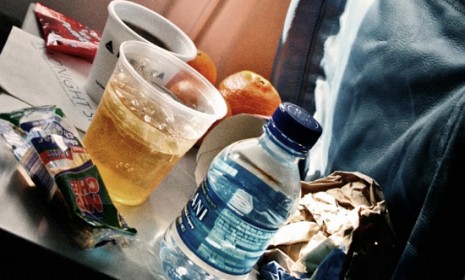How did sewing needles end up in Delta's food?
Passengers on four Delta flights from Amsterdam to the U.S. find an unwelcome garnish on their turkey sandwiches, provoking an FBI investigation

A free daily email with the biggest news stories of the day – and the best features from TheWeek.com
You are now subscribed
Your newsletter sign-up was successful
A handful of business class passengers on four Delta Air Lines flights from Amsterdam to the U.S. got an unpleasant surprise when they bit into their hot turkey sandwiches on July 15: Sewing needles. The needles — about an inch long and sharp on both ends — are only known to have injured one passenger, Minneapolis-bound James Tonjes. "I'll be very honest, the first bite, I thought, 'Boy, this is pretty good,'" Tonjes said of his sandwich. "It was the second bite that got me." The FBI and Dutch police have launched criminal investigations, and Delta and airline caterer Gate Gourmet are conducting their own inquiries. Here, a look at the food fright:
Who made the sandwiches?
Swiss caterer Gate Gourmet says the turkey sandwiches were put together and packaged at its Amsterdam facility — one of 122 flight kitchens the company operates on five continents. Gate Gourmet prepares 250 million meals a year for numerous airlines, none of which have reported needle incidents in the past. Still, this isn't Gate Gourmet's first black mark: In 2005, the FDA cited the caterer for, among other violations, allowing meat to get too warm and letting live flies and roaches congregate near its salad preparation areas. The U.S. has stricter food-preparation standards than Europe, food safety consultant Roy Costa tells the AP. "There's just a huge hole there."
The Week
Escape your echo chamber. Get the facts behind the news, plus analysis from multiple perspectives.

Sign up for The Week's Free Newsletters
From our morning news briefing to a weekly Good News Newsletter, get the best of The Week delivered directly to your inbox.
From our morning news briefing to a weekly Good News Newsletter, get the best of The Week delivered directly to your inbox.
Have authorities identified any motive for the random jabbing of passengers?
If so, they're not saying. "We are keeping all options open because at this moment, we have no idea why somebody or something put needles inside the sandwiches," says Robert van Kapel, a spokesman for Amsterdam's Schiphol airport. The U.S. Transportation Security Administration says it doesn't view the needle sandwiches as a national security issue, and former FBI assistant director Tom Fuentes says he thinks they're more "along the lines of a serious prank" than a terrorist issue. As a precaution, Tonjes is taking a 28-day course of medication to prevent infections, including HIV and hepatitis.
I have to walk through a scanner. Isn't my airplane meal screened?
It's supposed to be. "Food delivery to airports is a very strict process," says former FBI and Los Angeles airport agent Erroll Southers. The food is usually prepared at facilities off the airport grounds, but the food preparers and delivery truck drivers undergo background checks, and the trucks are "inspected for everything from sealed packages to explosive devices" before entering the airport. In the U.S., the TSA watches the meal trucks at the airport, and local authorities do the same overseas. Cabin crews also try to check the food before they serve it, says Dutch airline union official Ton Scherrenberg, "but you can't check every single sandwich."
A free daily email with the biggest news stories of the day – and the best features from TheWeek.com
Will this turn people off of airline food?
Probably not, as long as this remains an isolated incident, travel blogger Gary Leff tells CNN. "I mean, this isn't going to be the first thing ever found in airline food and certainly not the first thing found in restaurant food," he says, adding that most people will be revolted "for about 15 minutes" then file it away with all the other gross things they read about. "I think most people are just so happy to be served food in the sky that they'll forget it pretty quickly."
Sources: AP, Bloomberg, CNN, Minneapolis Star Tribune, Reuters